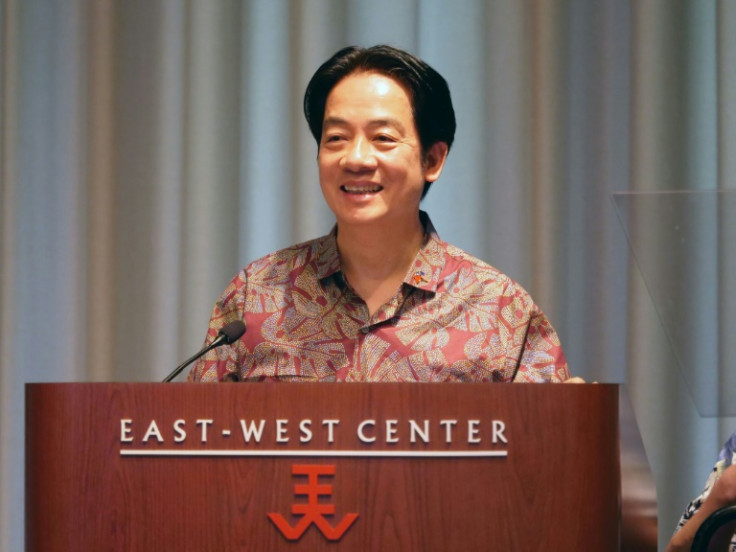Taiwan's Lai Talks 'China Threats' With Ex-US House Speaker Pelosi

Taiwan President Lai Ching-te discussed "China's military threats" toward the island in a call with former US House speaker Nancy Pelosi on Sunday, drawing a fresh barrage of criticism from Beijing.
Pelosi's long-standing support for Taiwan has infuriated China, which responded to her visit to Taipei in 2022 with massive military drills around the island.
Lai and Pelosi discussed "China's military threats toward Taiwan", presidential spokeswoman Karen Kuo told reporters, describing the 20-minute call between the "long-time friends" as "warm and amicable".
China, which insists the island is part of its territory, opposes any international recognition of Taiwan and its claim to be a sovereign state.
Beijing especially bristles at official contact between the island and the United States, which is Taiwan's most important supporter and biggest arms supplier.
China has already fumed over more US arms sales to the island and Lai's stop in Hawaii, where he was welcomed with red carpets, garlands of flowers and "alohas".
In response to Lai's conversation with Pelosi, China called on the United States to "stop meddling with Taiwan" and cease "supporting and indulging Taiwan independence separatist forces".
"The Taiwan issue is the core of China's core interests and the first red line that cannot be crossed in China-US relations," foreign ministry spokesman Lin Jian told reporters in Beijing.
Since arriving in Hawaii on Saturday at the start of a Pacific tour, Lai has met with state Governor Josh Green, members of the US Congress, officials from the de facto US embassy in Taiwan and others.
In his first public speech of the trip, Lai said Saturday that we have to "fight together to prevent war," warning there were "no winners" from conflict.
On the eve of Lai's week-long Pacific tour, the United States approved a proposed sale to Taiwan of spare parts for F-16s and radar systems, as well as communications equipment, in deals valued at $385 million in total.
China's foreign ministry called on the United States over the weekend to "immediately stop arming Taiwan".
"China will take strong and resolute countermeasures to firmly defend national sovereignty, security and territorial integrity," it added.
In a separate statement, the foreign ministry said China "strongly condemns" the United States for Lai's stopover and that it had "lodged serious protests with the US".
Pelosi was one of "several long-time friends in the United States" whom Lai spoke to on Sunday, Kuo told reporters.
They included "cross-party figures who reiterated their steadfast support for Taiwan", she said.
Lai and Pelosi also discussed artificial intelligence and the semiconductor industry, Kuo said.
The Taiwanese leader addressed the East-West Center in a closed-door forum on Sunday, emphasizing Taiwan's "commitment" to boosting its defenses and to "its own security", as well as the "shared commitment between Taiwan and the US to regional peace", according to Kuo.
Taiwan faces the constant threat of a military attack by China, which regularly deploys fighter jets and warships around the self-ruled island to press its claims, and Beijing has not ruled out the use of force to bring the island under its control.
While the United States has sold billions of dollars worth of arms to Taiwan, Washington has long maintained a "strategic ambiguity" when it comes to putting boots on the ground to defend the island from Beijing.
Lai's remarks followed China's threats last week to "resolutely crush" any attempts for Taiwan independence and ahead of US President-elect Donald Trump taking office in January.
Trump caused jitters during his campaign by suggesting Taiwan should pay the United States for its defense and accusing the island of stealing the US semiconductor industry.
After Hawaii, Lai will visit Taiwan's allies the Marshall Islands, Tuvalu and Palau -- the only Pacific island nations among the 12 remaining allies that recognize Taiwan's claim to statehood -- and stop over for one night in the US territory of Guam.
Lai said shortly before take-off in Taipei that the trip "ushered in a new era of values-based democracy" and thanked the US government for "helping to make this trip a smooth one".
He said he wanted to "continue to expand cooperation and deepen partnerships with our allies based on the values of democracy, peace and prosperity."
"I once again emphasize that we are all Team Taiwan. We all work together, and we can successfully achieve our goals," Lai told reporters on board the plane.
© Copyright AFP 2025. All rights reserved.





















